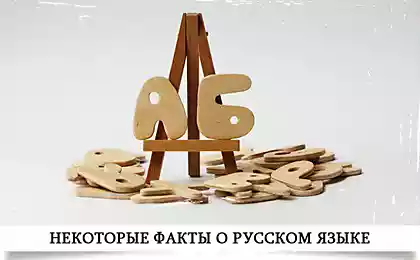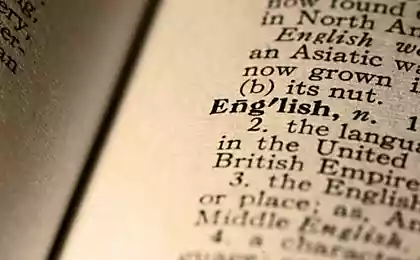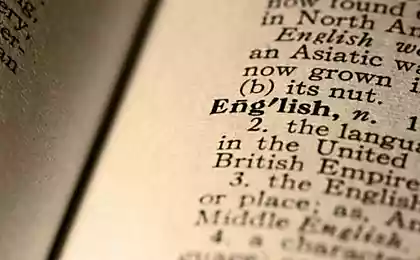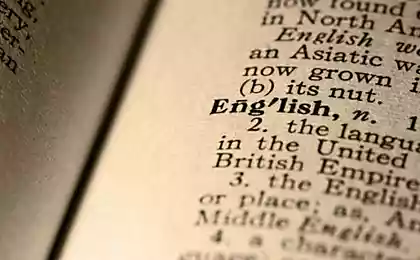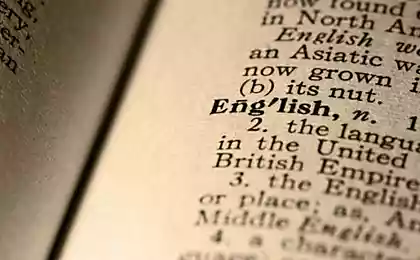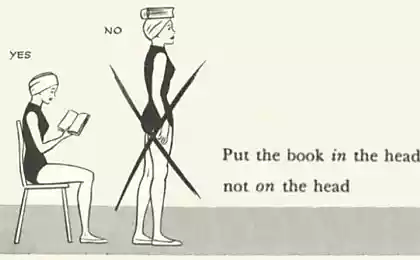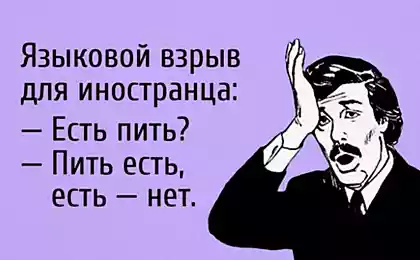685
20 common mistakes in the Russian language, who at least once in his life did every
These mistakes - it's not even an error, and a curse: because we all know very well how, but intuition leads us constantly! In addition, it is difficult to keep track of them, when all around misinterpret slova.Sayt published a collection of the most common mistakes and correct spellings of words and utterances.

1. Day rozhdeniyaByvaet in Russian so that the frequency of use of words and turns of erases all linguistic norms. So it was with "Happy Birthday».
Like its just not distort! First, no "I'm going to the birthday" and "I congratulate you on Happy Birthday" can not be.
Secondly, there is a "birthday", but there is no "birthday».
Finally, many write both words capitalized like that gives expression significance, but according to the rules of the Russian language is wrong. Acceptable, but not quite correct (the birthday is not an international triumph), write with a capital letter the first word, but not both.
2. Theirs, EVOH, eёnyyChto just not get up our creative people with possessive pronouns! Speak and "theirs" (them), and "EVOH" (it), and "eёny" (her).
We are not purists and do not claim that these words should not be. They are, it is only colloquial speech, the use of which may be justified either in speech or in literature as the reception.
3. obschemEst the word "general", "in general", last but not allowed to use the words "in general" and "general". Despite the obviousness of this thesis, such an error is still one of the most common.
4. ZvonitTut can not talk long. Use of the word "Call" with the accent on the first syllable is so common mistake in speech that sometimes hunt quickly run to the library and arrange a detoxification Ozhegova.
5. The Company and kampaniyaEst sociable people, them well for the company to go to some party. Actually, the word "company" is derived from the Latin panis (bread) that is initially called by a group of companions
The word "campaign" comes from another word - campus, that is, "field", including the battlefield. Originally, the word "campaign" refers to a military campaign. These two words - homophones, ie sound the same but are spelled differently. Remember the difference can be as follows: the company decided to launch a campaign.
6. LozhitEst perfect verb form "to put." Form imperfect form - "put", but not "lay down" as you can often hear. This form of vernacular, it is recommended to use the bench in the countryside.
7. Do not niNastoyaschaya headache and proofreaders and editors. Lawful use of these particles often are not always obvious.
The particle "no" is usually used in the amplifier and the denial from the predicate, it can also be used as the connecting union.
The particle "no" usually expresses negation. If you are in doubt, look in the dictionary.
8. Dress and nadetEsche one very common mistake in speech. You can put someone and put on something for yourself or someone else. For the assimilation of rules nemudrenyh enough to remember the mnemonic phrase "Wear clothes to dress Hope».
9. tsya tsyaNesmotrya and that the spelling "tsya" and "tsya" verbs is easy to check (one has to wonder "what © doing?", "What to do ©?". If the matter is, the soft sign, it will be and "tsya") this error occurs very often.
10. EdinitsaKazalos would write the word "unit", check it with the word "one" and everything will fall into place, but there is ... Many persistently somehow write "UNIT" and that's it ... Do not be so.
11. budtoPisat anywhere hyphens - a common mistake many people. "How" is spelled with a hyphen if it is followed by "the," "a," "something." The particle "if" is written separately.
12. Do not likely liTut everything is simple: the particle "if", no matter how we add it like a hyphen, written separately. You just need to remember. As you can remember the mnemonic reception of Bruce Lee and imagine what it does to those who make mistakes in such simple words.
13. How much time? If you fit the man and asks: "How much time?", You'll probably answer, but you know - he said wrong. Correct would be "how long?" And "what time?».
14. EspressoNe lucky Overseas words in Russian. They constantly alter. From the words commonly used today can remember the name of the coffee "espresso", "latte" and "cappuccino". First constantly want to be called "Express", the second constantly strive to make emphasis on the last word, though right at first, in the third when writing for some reason put the two "h».
15. Take odolzhitFinansovaya and literacy in Russia leaves much to be desired, it is not surprising that the word "take" and "borrow" we are constantly confused. "Borrow" - to borrow it, so to speak "borrow me the money" is wrong. You also can not take someone only someone. Correctly will "lend me the money," or "Can I take you?».
16. techenieNachinaya at school, the words "for" and "within" is often incorrectly written. First, write one word, that is a gross mistake, secondly, confused letter at the end of words.
Remember, how to write, you can. Preposition with a noun "within" can be divided dependent word and the adverb "during" indivisible. For example, in the fast-flowing river (the preposition with a noun), during the evening (adverb).
17. PriytiSovershenny view of the verb "to go" is often written as "come" or "come". What is right? Right on the modern rules of language to write "come." Difficulties in writing this verb come from such a phenomenon of Russian as Suppletion, that is, the formation of different forms of words from different roots. That is, we write "go" but "coming." Option to "come" is now considered obsolete.
18. BuduschiyKogda we say the word "future" and would like to add to it by analogy with, for example, as the word "next" extra "w". But to do so not worth it, no matter how desirable.
19. Bear in mind, "Bear in mind" is always written separately. Just remember that if you wish to have considered literate person. But there is an excuse "in view" of value "because" do not confuse.
20. Zapyatyemezhdu subject and predicate Never put commas between subject and predicate. This is a gross mistake. Is that between them is an introductory word or definition, but they are isolated by their own rules.
via russian7.ru/2015/09/20-samykh-chastykh-oshibok-pri-upotreblenii/

1. Day rozhdeniyaByvaet in Russian so that the frequency of use of words and turns of erases all linguistic norms. So it was with "Happy Birthday».
Like its just not distort! First, no "I'm going to the birthday" and "I congratulate you on Happy Birthday" can not be.
Secondly, there is a "birthday", but there is no "birthday».
Finally, many write both words capitalized like that gives expression significance, but according to the rules of the Russian language is wrong. Acceptable, but not quite correct (the birthday is not an international triumph), write with a capital letter the first word, but not both.
2. Theirs, EVOH, eёnyyChto just not get up our creative people with possessive pronouns! Speak and "theirs" (them), and "EVOH" (it), and "eёny" (her).
We are not purists and do not claim that these words should not be. They are, it is only colloquial speech, the use of which may be justified either in speech or in literature as the reception.
3. obschemEst the word "general", "in general", last but not allowed to use the words "in general" and "general". Despite the obviousness of this thesis, such an error is still one of the most common.
4. ZvonitTut can not talk long. Use of the word "Call" with the accent on the first syllable is so common mistake in speech that sometimes hunt quickly run to the library and arrange a detoxification Ozhegova.
5. The Company and kampaniyaEst sociable people, them well for the company to go to some party. Actually, the word "company" is derived from the Latin panis (bread) that is initially called by a group of companions
The word "campaign" comes from another word - campus, that is, "field", including the battlefield. Originally, the word "campaign" refers to a military campaign. These two words - homophones, ie sound the same but are spelled differently. Remember the difference can be as follows: the company decided to launch a campaign.
6. LozhitEst perfect verb form "to put." Form imperfect form - "put", but not "lay down" as you can often hear. This form of vernacular, it is recommended to use the bench in the countryside.
7. Do not niNastoyaschaya headache and proofreaders and editors. Lawful use of these particles often are not always obvious.
The particle "no" is usually used in the amplifier and the denial from the predicate, it can also be used as the connecting union.
The particle "no" usually expresses negation. If you are in doubt, look in the dictionary.
8. Dress and nadetEsche one very common mistake in speech. You can put someone and put on something for yourself or someone else. For the assimilation of rules nemudrenyh enough to remember the mnemonic phrase "Wear clothes to dress Hope».
9. tsya tsyaNesmotrya and that the spelling "tsya" and "tsya" verbs is easy to check (one has to wonder "what © doing?", "What to do ©?". If the matter is, the soft sign, it will be and "tsya") this error occurs very often.
10. EdinitsaKazalos would write the word "unit", check it with the word "one" and everything will fall into place, but there is ... Many persistently somehow write "UNIT" and that's it ... Do not be so.
11. budtoPisat anywhere hyphens - a common mistake many people. "How" is spelled with a hyphen if it is followed by "the," "a," "something." The particle "if" is written separately.
12. Do not likely liTut everything is simple: the particle "if", no matter how we add it like a hyphen, written separately. You just need to remember. As you can remember the mnemonic reception of Bruce Lee and imagine what it does to those who make mistakes in such simple words.
13. How much time? If you fit the man and asks: "How much time?", You'll probably answer, but you know - he said wrong. Correct would be "how long?" And "what time?».
14. EspressoNe lucky Overseas words in Russian. They constantly alter. From the words commonly used today can remember the name of the coffee "espresso", "latte" and "cappuccino". First constantly want to be called "Express", the second constantly strive to make emphasis on the last word, though right at first, in the third when writing for some reason put the two "h».
15. Take odolzhitFinansovaya and literacy in Russia leaves much to be desired, it is not surprising that the word "take" and "borrow" we are constantly confused. "Borrow" - to borrow it, so to speak "borrow me the money" is wrong. You also can not take someone only someone. Correctly will "lend me the money," or "Can I take you?».
16. techenieNachinaya at school, the words "for" and "within" is often incorrectly written. First, write one word, that is a gross mistake, secondly, confused letter at the end of words.
Remember, how to write, you can. Preposition with a noun "within" can be divided dependent word and the adverb "during" indivisible. For example, in the fast-flowing river (the preposition with a noun), during the evening (adverb).
17. PriytiSovershenny view of the verb "to go" is often written as "come" or "come". What is right? Right on the modern rules of language to write "come." Difficulties in writing this verb come from such a phenomenon of Russian as Suppletion, that is, the formation of different forms of words from different roots. That is, we write "go" but "coming." Option to "come" is now considered obsolete.
18. BuduschiyKogda we say the word "future" and would like to add to it by analogy with, for example, as the word "next" extra "w". But to do so not worth it, no matter how desirable.
19. Bear in mind, "Bear in mind" is always written separately. Just remember that if you wish to have considered literate person. But there is an excuse "in view" of value "because" do not confuse.
20. Zapyatyemezhdu subject and predicate Never put commas between subject and predicate. This is a gross mistake. Is that between them is an introductory word or definition, but they are isolated by their own rules.
via russian7.ru/2015/09/20-samykh-chastykh-oshibok-pri-upotreblenii/
Artist Beret Mediocre Dolls and turn them into celebrities
10 recent paintings by artists who have committed suicide. Many works seem painfully unfinished ...

